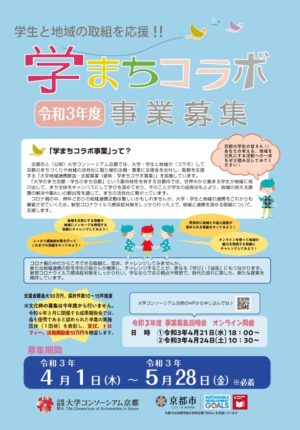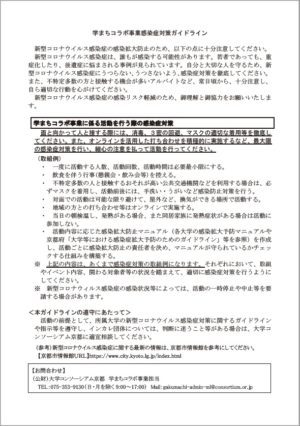- Business Overview
- Target Businesses
- Target Organizations
- Amount and number of donations
- About the application
- Main Schedule for the Future
- Selection Results
- Implementation Report
- Learning Town NEWS!
- Inquiries
Gakumachi Station
http://www.gakumachi.jp/search-result/?_sfm_category=collabo&_sfm_year=2019
Business Overview
Kyoto City and the University Consortium Kyoto are implementing the “University Regional Collaboration Creation and Support Project (nicknamed the Gakumachi Collaboration Project)” to support the efforts by granting support funds to projects and projects that work on urban development and regional revitalization in Kyoto through “collaboration” between universities, students, and local communities.
This year marks the 18th year of the program, with the aim of developing human resources by securing practical education and research opportunities for universities, and for local communities, solving local issues and revitalizing them through the knowledge of the university and the vitality of students.
* The second year of Reiwa was canceled due to the influence of the new coronavirus infection.
* The “cultural frame” that has been in place since the 29th fiscal year will not be recruited from this fiscal year.
Target Businesses
With the aim of solving local issues and revitalizing the city of Kyoto, projects that meet the following requirements are implemented in Kyoto City during the 3rd year of Reiwa (from the date of adoption until the end of March of the following year (4th year of Reiwa)) are eligible.
However, political activities, religious activities, activities that promote specific ideas, violent or destructive activities, commercial businesses, etc. are excluded.
★ New businesses that can be expected to collaborate with local communities in the future are also permitted.
In the midst of the coronavirus pandemic, it is expected that it will be difficult to carry out the regional cooperation activities that have been carried out so far, and it will be difficult to deepen cooperation with the community, so this time, we will also target projects that have not been decided on a specific partner at the time of application, or projects aimed at making proposals to the community (such as creating a store PR video to promote shopping streets). However, even in such cases, it is desirable to grasp the needs of the community while utilizing online and other means.
【Requirements】
(1) Projects in which universities and student groups and local communities (residents’ organizations, civic activity groups, businesses, etc., mainly in the Kyoto City area) collaborate and collaborate as organizations and groups, and in particular, students take the initiative in their activities.
* Administrative agencies may be included as collaborators, but cooperation with administrative agencies alone is not possible.
Examples: Health and welfare, social education, community development, promotion of academic, cultural, artistic or sports, environmental conservation,
Surveys and research in various fields such as community safety, citizen lectures, events, etc.
(2) Those who have not received any subsidies or subsidies from Kyoto City other than the Gakumachi Collaboration Project.
(3) Those that comply with the guidelines for infectious disease control of the school town collaboration project.
*1: For details on the guidelines, please refer to the “Guidelines for Infectious Disease Control for Academic Town Collaboration Projects”.
(For application guidelines and guidelines, click on each image on this page to view the PDF version.) )
*2: Depending on the infection status of the new coronavirus infection, we may request that activities be temporarily suspended or discontinued.
If you are unsure about how to proceed with your future activities, please contact the University Consortium Kyoto.
Target Organizations
Organizations and groups of University Consortium, Kyoto member universities and junior colleges (*1)
or
A local organization that mainly works in the Kyoto city area (*2)
(*1) University departments, laboratories, seminars, clubs, student circles (circles composed of students from multiple universities are also acceptable), etc.
*2 Residents’ organizations such as residents’ associations and neighborhood associations, civic activity groups, groups and groups consisting of businesses, etc. (shopping streets, etc.)
Amount and number of donations
Up to 300,000 yen / 10-15 cases
* At the project report meeting scheduled to be held in March of Reiwa 4, the implementing organization (1 organization) recognized as the most outstanding will be commended (certificates, trophies, and activity incentives of 100,000 yen will be issued separately).
* We will not be accepting applications for the cultural quota from this year.
About the application
Application Period
April 1 (Thu) ~ May 28 (Fri) in Reiwa 3rd year
* If you send it by mail, it must arrive on the same day, and if you bring it by 5 p.m.
Reiwa 3rd year business recruitment briefing session * Held online
Date and time: (1) Wednesday, April 21, 3rd year of Reiwa, 18:00〜
(2) Saturday, April 24, 3rd year of Reiwa, 10:30〜
We also accept questions about how to write an application.
*If you would like to participate, please apply from the following. (Click Apply to open the application form.) )
We will send the URL of the webinar (planned) to those who apply by email.

*This year’s application has ended.
How to apply: Step 1 Before you start writing your application
We recommend reading the master plan of the administrative district in which the activity will be carried out! In addition, please listen to the opinions of local people and related government agencies as much as possible regarding the background of the project implementation and the needs of the community. If you have any questions about the basic plan of the ward or points to keep in mind when working in the community, you can also consult with the Regional Power Promotion Office of each ward office or branch.
In addition to reconfirming and sharing your objectives and goals, let’s discuss and think again about whether the business you are thinking about is the best way to achieve your goals. In addition, for continuing projects, let’s thoroughly summarize the efforts made so far and organize the points for improvement and novelty so that they can be reflected in the application form.
How to apply: Step 2 Let’s write an application!
<Click here to download documents related to the FY2021 project application>
● FY2021 Application Guidelines
● FY2021 Application Form (Microsoft WORD)
● Example of Completed Application Form
| Points to fill in |
★ Let’s check the judging criteria! ★ What is the purpose of the business? Write down your purpose and local needs. ★ Who are you working with (or planning to work with)? What is the role of each? Let’s be specific. ★ Is it okay to take measures against infectious diseases? Let’s write in detail by thinking about initiatives, event contents, target audiences, etc. |
If you have trouble writing application documents…
“There are things I want to do, but I don’t feel comfortable going out in the midst of the Corona disaster…”, “It’s an event involving the elderly, but is it okay to take measures against infectious diseases?”, “I want to set up an internet environment, but can I use the support money?” If you have any concerns or questions, please feel free to contact the University Consortium Kyoto. In addition to the previous consultations by phone and e-mail, we are also accepting online consultations from this time.
How to apply: Step 3 Register your business outline
Please register your business outline using the form below.

*This year’s application has ended.
How to apply: Step 4 Submission of application documents
Please submit it by mail or bring it to the person in charge of the Gakumachi Collaboration Project within the application period.
(1) 15 copies of application documents *If there are reference materials (up to 10 sheets), submit 15 copies of reference materials
(2) Application document data (MS-Word) * If reference materials are available, submit reference data (PDF) as well.
* Please do not change the prescribed form downloaded from the University Consortium Kyoto website for both (1) and (2).
Main Schedule for the Future
First screening: After application deadline – mid-June
Second screening (presentation screening): Sunday, June 20, 2021 *Scheduled to be held online.
Support projects will be decided and the selection results will be notified: Early July, 2021
Certification ceremony: Monday, July 12, 2021 *Certificates will be issued by Kyoto City for certified projects.
Interim report: Friday, October 29, 2021 *Document submission
Final report: March, 2022 *Document submission
Reporting meeting: Mid- to late March, 2022
Recruitment of General Auditors for the Second Screening (Presentation Screening)
Presentation
* In the 3rd year of Reiwa, it will be held online.
At the judging meeting, the groups that passed the document screening of the first selection elaborated
This is an opportunity to see the efforts of the university and students in collaboration with the local community.
Reiwa 3rd year “Gakumachi Collaboration Project” presentation judging meeting
|
Date and Time |
Sunday, June 20, 2021 10:00~14:10 |
| Venue | Online (Zoom Webinar) |
| Flow of the day |
Second Screening (Presentation Judging) Schedule |
| Participation fee: | Free |
★ Registration
Tuesday, June 15, 2021 ~ Saturday, June 19, 2021 17:
If you would like to participate,
Fill in your name and contact information.
We will inform you of the URL of the Zoom webinar.
Selection Results
First Screening (Document Screening)
13 projects that passed the first selection round
Second Screening (Presentation Judging)
On June 20, 2021, the second selection meeting (presentation screening meeting) was held, and 11 projects were certified as support projects as follows.
List of 11 Approved School-City Collaboration Projects for FY2021 (in order of application)
| Project Name | Organization 【Affiliated University】 Administrative Area |
Project Overview |
|---|---|---|
| Art Festival BORDER!2021 |
BORDER! Executive Committee 【Kyoto City University of Arts, Kyoto Seika University, Seian University of Art and Design】 Areas: Sakyo Ward, Nakagyo Ward, Shimogyo Ward |
With the goal of promoting and developing artistic activities among younger generations in the Kyoto area, Art Festival BORDER! is held as a space where various genres of “creation” transcend boundaries and meet, sparking new forms of creation and connecting all creators. |
| Daigomi eets | Daigomi eets Association 【Kyoto Tachibana University】 Area: Fushimi Ward |
Stage events centered on students and school clubs from elementary to university levels are held on the same day at multiple venues in the Daigo area of Fushimi Ward. Through performances by students and children, the project aims to share the cultural potential of Daigo and create richer culture and community appeal through exchange and collaboration. |
| Soycal from Shizuhara – Connecting the Future Through Soybeans | Future Broadcasting Station Omusubi Shizuhara Support Team 【Kyoto Sangyo University】 Area: Sakyo Ward |
To promote local production and consumption of soybeans, essential to Kyoto’s food culture, the project cultivates fallow land in Shizuhara to grow soybeans. Events are held to showcase the appeal of Kyoto-grown soybeans and build a brand. Agricultural exchange activities also address regional issues like increasing fallow land and depopulation. |
| Children’s Science Classroom | Exciting Lab 【Bukkyo University】 Area: All of Kyoto City |
Free science experiment classes are held at Bukkyo University’s Murasakino Campus after school or on holidays as a welcoming space for children. Outreach activities are also conducted at local children’s centers and events across Kyoto city upon request. |
| “Sagasuke”: An Automatic Search System for Wandering Elderly Using Facial Recognition | Student Group Uepokku 【Kyoto University, Doshisha University, Ritsumeikan University, Osaka University, Kwansei Gakuin University, Yamato University, Osaka City University Graduate School】 Areas: Kamigyo Ward, Sakyo Ward |
As dementia cases rise with aging, the burden of locating wandering elderly often falls on caregivers. This project explores the feasibility of an automatic search and rescue system using facial recognition cameras on vehicles and a taxi protection service, aiming to sustain caregiving as a compassionate practice. |
| Rediscovering Life in the Nakagawa Area – Tea to Beer Project | And House 【Otani University】 Area: Kita Ward |
Local residents grow a traditional tea called “Manma Tea,” harvested by Otani University students and used to brew craft beer in collaboration with NPO HEROES, which works with individuals with autism. Together, they promote and sell the beer, sharing the charm of the Nakagawa area. |
| Changing City, Kikuhama – Creating a Historical/Cultural Resource Map | Kyoto University Yanagisawa Lab / Kikuhama Project 【Kyoto University】 Area: Shimogyo Ward |
Focusing on the Kikuhama area in Shimogyo Ward, students specializing in architecture conduct surveys on historical buildings and local businesses, and interviews with long-time residents. In collaboration with local organizations, the results are compiled into a map to serve as a foundational resource for envisioning the area’s future. |
| Kamo Cinema 16 | Kamo Cinema 16 Executive Committee 【Ritsumeikan University】 Area: Kamigyo Ward |
To promote environmental conservation and awareness of the Kamo River, cleaning activities and children’s events are held during the day. At night, an outdoor cinema is set up by the riverbank for local residents and youth. |
| Keihoku Utsu Community Learning and Bonding | Kyoto Seika University Keihoku Utsu Treasure Hunt Association 【Kyoto Seika University】 Area: Ukyo Ward |
The natural surroundings, culture, history, townscape, lifestyle, and people of the Keihoku Utsu area are all seen as “treasures.” Workshops for local children, supported by the Utsu Residents’ Association and others, help rediscover, nurture, and promote these treasures, aiming to revitalize the community. |
| Sharing Umezu’s Appeal with Local Youth – Digital × Analog Strategy | Umezu Town Planning Committee + Inui Seminar Umezu Team 【Ritsumeikan University】 Area: Ukyo Ward |
To share the appeal of Umezu’s history and nature with younger generations, the local committee digitizes and shares data about Umezu’s charms online. A printed booklet is also created for the analog generation. |
| Susuhito Leather Industry Sustainability Project | Susuhito Leather Industry Sustainability Project 【Kyoto Women’s University, Ryukoku University, Kyoto City University of Arts】 Area: Shimogyo Ward |
Aiming to pass down the proud leather culture of the Susuhito district, students from Kyoto City University of Arts and local residents plan and carry out various events, including leather workshops at Susuhito Children’s Center. The project fosters exchange between university students and local children and residents. |
Implementation Report
Reiwa 3rd Presentation Screening Meeting (Second Selection Meeting) * Held online
On Sunday, June 20, 2021, the second selection meeting (presentation judging meeting) of the Reiwa 3rd year Gakumachi collaboration project was held. Due to the influence of the new coronavirus infection, the Gakumachi collaboration project itself was canceled in the second year of Reiwa, and this year’s presentation judging was held online for the first time. The applicants made their presentations online, and the judges judged from Campus Plaza Kyoto.
The students seemed to be accustomed to the operation, perhaps due to the influence of online classes, and screen sharing was carried out smoothly, and their passion for the project and how to promote cooperation with the local community was conveyed. In response to the students’ thoughts, the judges asked questions that were sometimes harsh but full of expectations.
Although it is difficult to carry out activities as much as I would like in the midst of the Corona disaster, I got the impression that they are trying their best to do what they can in this situation, taking care of infection control measures and utilizing online. Presentations are also unique to online! Some members of the group appealed by participating online from their usual activity locations, and the venue was crowded.
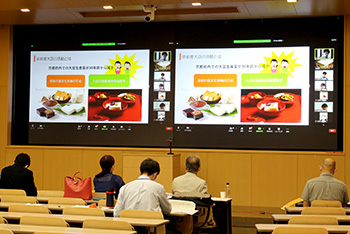
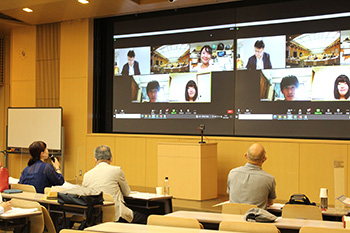
Reiwa 3rd Fiscal Year Project Certification Ceremony
On Monday, July 12, 2021, a certification ceremony was held at Kyoto City Hall for the Reiwa 3rd year Gakumachi Collaboration Project, and certificates were issued by Mayor Kadokawa Kyoto to the 11 organizations selected this year. Representatives of the organizations that received the certificates made a strong statement of determination. Some groups participated in unique attire to promote their efforts, such as the formal attire of the brass band club, the old boots they always wear in the fields, and the white coats of the science class, which further raised their expectations for the future.
In the comments from the selection committee members after the certification ceremony, they said that there was a tendency to receive many applications for new businesses due to the Corona disaster, that in order to continue activities in the same way as before, it is necessary to think together while relying on the local community and others, and that they want to know the thoughts and history of local people and seniors deeply and think about them while working on them. At times, I was told that I wanted them to work with humor and a sense of playfulness.
From now on, the activities of each organization will start in earnest.
Please pay attention to the report on the website of the University Consortium Kyoto, the university-regional collaboration portal site “GAKUMACHI STATION”, and facebook!
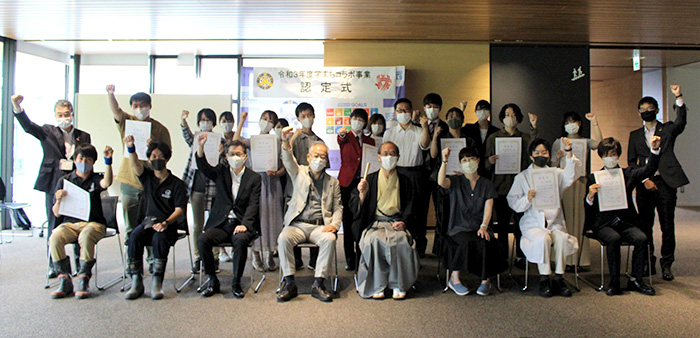
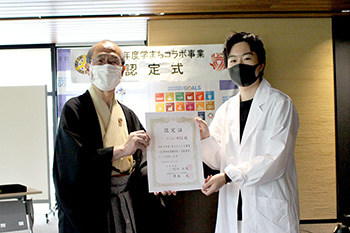
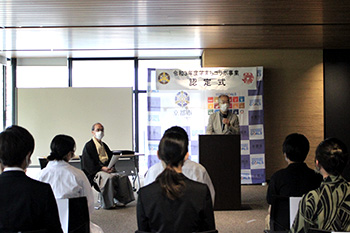
Achievement debriefing session *Held online
≪ debriefing session≫
In the Zoom webinar, 10 organizations selected in 2021 reported on their activities. In the six-minute allotted time, each organization gave a presentation on the results of their activities this year, and it was very clear how they were actively involved in the community. In addition, during the six-minute QA session, each organization responded sincerely to questions, with two minutes being asked by the pre-designated organizations and four minutes being asked by the judges.
≪Opinion exchange meetings and exchange meetings≫
After the debriefing session, the meeting was held via Zoom under the direction of the secretariat. The members of the selected organizations shared their favorite items and booklets on the screen as part of the activities of this project. After all the episodes were shown, each group was asked to vote for the episode that resonated with them the most using the Zoom voting function, and the “Mirai Transmission Station Omusubi Shizuhara Support Team,” which introduced the production of the “Soy Recipe Book,” was selected as the first place.
≪Award Ceremony and Commentary≫
Every fiscal year, we select and commend the business organizations that have achieved the most outstanding results from among the selected organizations, and present 100,000 yen as an activity incentive. As a result of the judging, the “Umezu Town Development Committee + Inui Zemi Umezu Group (Ritsumeikan University)”, which has been engaged in activities to disseminate the charm and fun of the Umezu School District online and in booklets, was selected as the best organization of the year. The award was given in recognition of the fact that it has built a relationship of trust with the local community, its versatility that can be used as a model for other regions, and the fact that it has carried out activities that can only be done in this era, such as fusing digital and analog during the Corona disaster, when it is not possible to carry out the same activities as before.
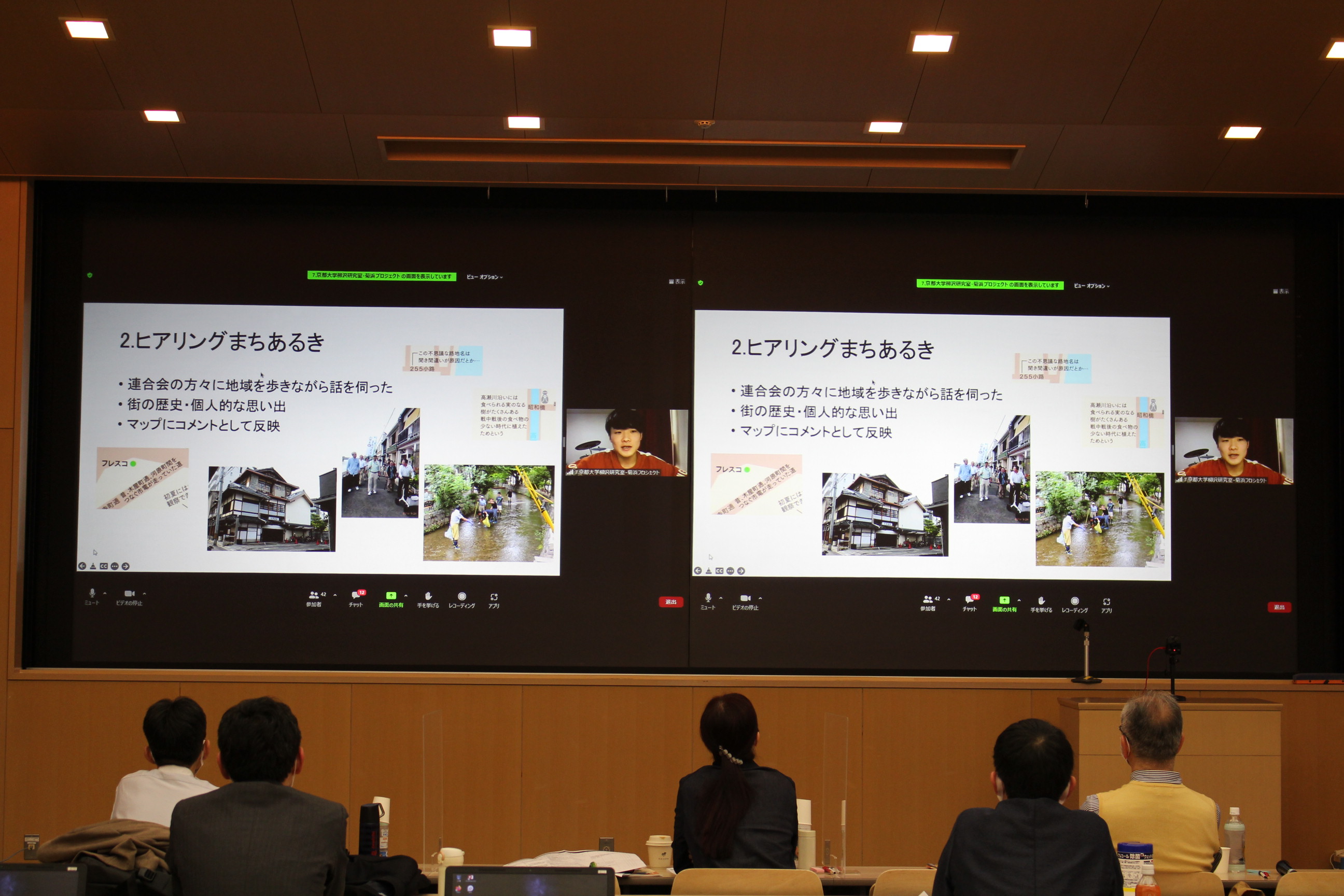
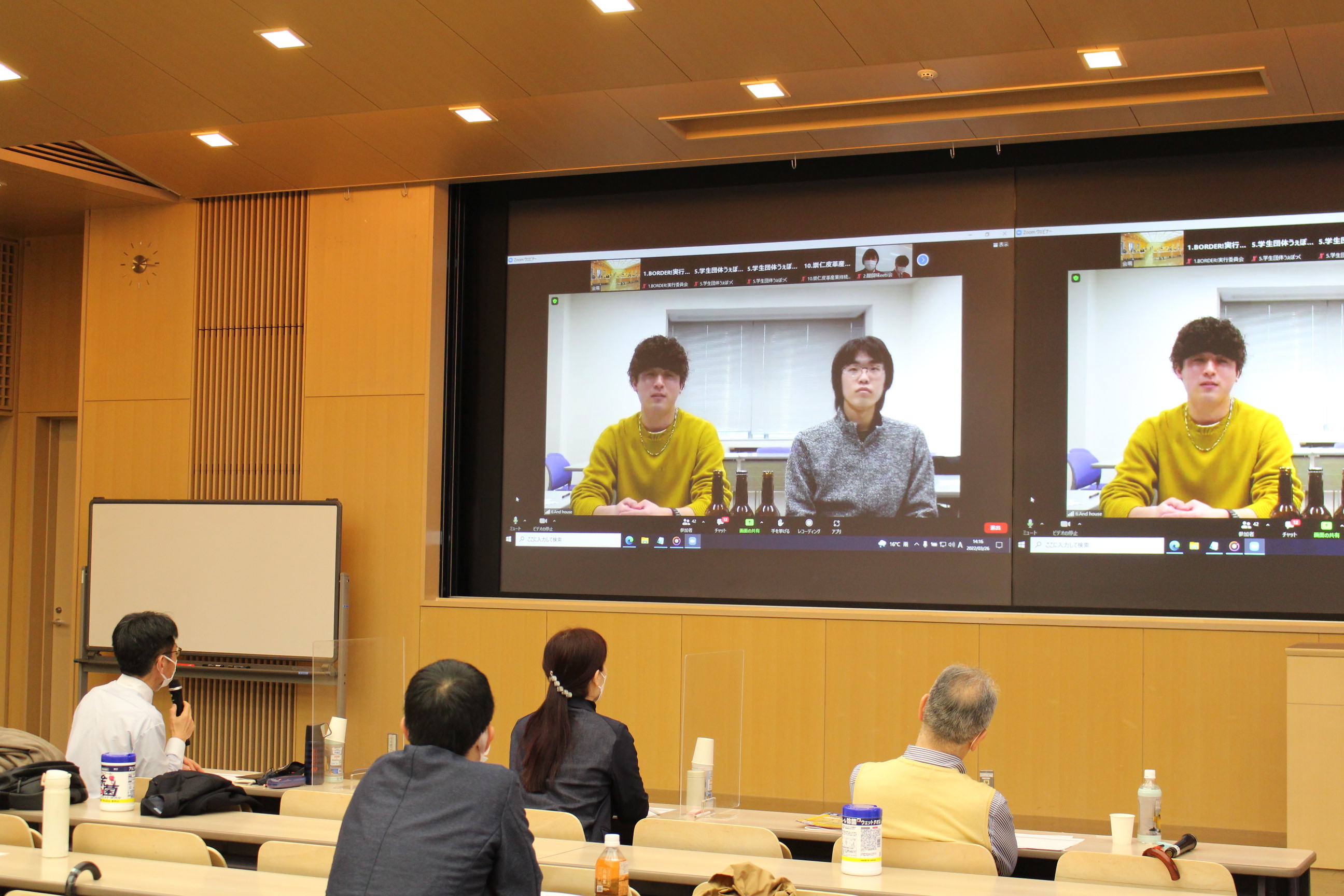

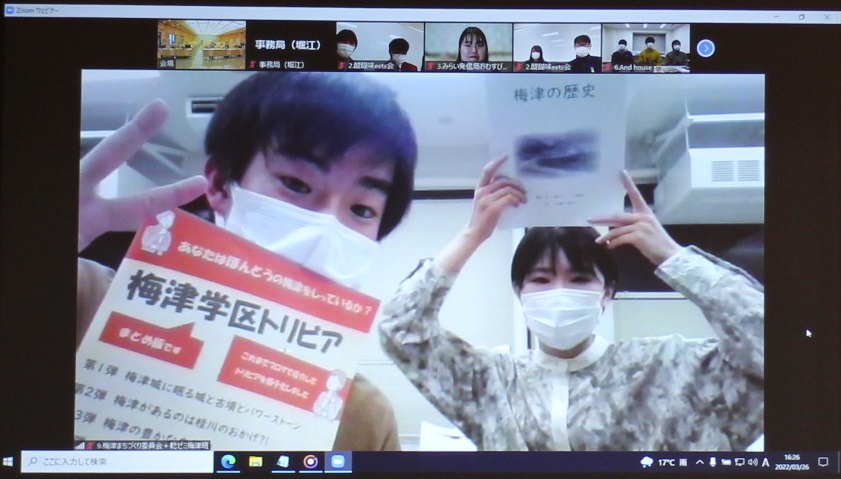
Learning Town NEWS!
We introduce the initiatives of the projects adopted in the Gakumachi Collaboration Project from time to time.
・ Reiwa 3rd year school town collaboration project Gakumachi NEWS!
Inquiries
University Consortium Kyoto Gakumachi Collaboration Project
TEL :075-353-9130 FAX: 075-353-9101
MAIL:gakumachi-admin-ml■consortium.or.jp
(Please change ■ to @ and send)
〒600-8216 Shimogyo-ku, Kyoto-shi, Nishitoin-dori, Shiokoji, Shimo-ku, Kyoto, Campus Plaza Kyoto
* Reception hours: Tuesday ~ Saturday 9:00 ~ 17:00














